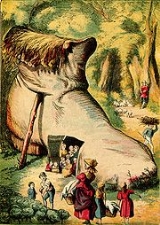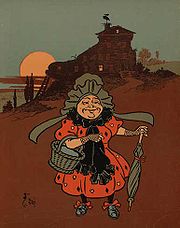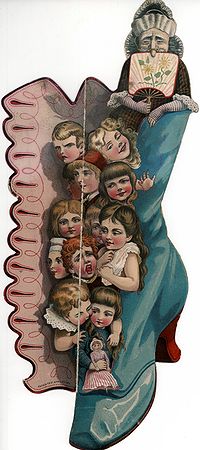
There was an Old Woman Who Lived in a Shoe
Encyclopedia


English language
English is a West Germanic language that arose in the Anglo-Saxon kingdoms of England and spread into what was to become south-east Scotland under the influence of the Anglian medieval kingdom of Northumbria...
nursery rhyme
Nursery rhyme
The term nursery rhyme is used for "traditional" poems for young children in Britain and many other countries, but usage only dates from the 19th century and in North America the older ‘Mother Goose Rhymes’ is still often used.-Lullabies:...
. It has a Roud Folk Song Index
Roud Folk Song Index
The Roud Folk Song Index is a database of 300,000 references to over 21,600 songs that have been collected from oral tradition in the English language from all over the world...
number of 19132.
Lyrics
The most common version of the rhyme is:
There was an old woman who lived in a shoeShoeA shoe is an item of footwear intended to protect and comfort the human foot while doing various activities. Shoes are also used as an item of decoration. The design of shoes has varied enormously through time and from culture to culture, with appearance originally being tied to function...
.
She had so many children, she didn't know what to do;
She gave them some brothBrothBroth is a liquid food preparation, typically consisting of either water or an already flavored stock, in which bones, meat, fish, cereal grains, or vegetables have been simmered. Broth is used as a basis for other edible liquids such as soup, gravy, or sauce. It can be eaten alone or with garnish...
without any breadBreadBread is a staple food prepared by cooking a dough of flour and water and often additional ingredients. Doughs are usually baked, but in some cuisines breads are steamed , fried , or baked on an unoiled frying pan . It may be leavened or unleavened...
;
Then whipCorporal punishmentCorporal punishment is a form of physical punishment that involves the deliberate infliction of pain as retribution for an offence, or for the purpose of disciplining or reforming a wrongdoer, or to deter attitudes or behaviour deemed unacceptable...
ped them all soundly and put them to bed.
The earliest printed version in Joseph Ritson's Gammer Gurton's Garland in 1794 has the coarser last line:
She whipp'd all their bums, and sent them to bed.
There were many other variations printed in the eighteenth and nineteenth centuries.
Origins and meaning
Iona and Peter Opie pointed to the version published in Infant Institutes in 1797, which finished with the lines:Then out went th' old woman to bespeak 'em a coffin,
And when she came back, she found 'em all a-loffeing.
The term "a-loffeing", they believed, was Shakespearean, suggesting that the rhyme is considerably older than the first printed versions. They then speculated that if this were true it might have a folk lore meaning and pointed to the connection between shoes and marriage, symbolised by casting a shoe when a bride leaves for her honeymoon.
Debates over the meaning of the rhyme largely revolve around matching the old woman with historical figures, as Peter Opie observed 'for little reason other than the size of their families'. Candidates include:
- Queen CarolineCaroline of AnsbachCaroline of Brandenburg-Ansbach was the queen consort of King George II of Great Britain.Her father, John Frederick, Margrave of Brandenburg-Ansbach, was the ruler of a small German state...
, the wife of King George IIGeorge II of Great BritainGeorge II was King of Great Britain and Ireland, Duke of Brunswick-Lüneburg and Archtreasurer and Prince-elector of the Holy Roman Empire from 11 June 1727 until his death.George was the last British monarch born outside Great Britain. He was born and brought up in Northern Germany...
, who had eight children. - Elizabeth Vergoose of Boston, who had six of her own children and ten stepchildren.
There is no evidence to identify either of these candidates with the unnamed subject of the rhyme.
In popular culture
- There Was an Old WomanThere Was an Old Woman (novel)There Was an Old Woman is a novel that was published in 1943 by Ellery Queen. It is a mystery novel primarily set in New York City, USA.-Plot summary:Mrs...
is the title of a 1943 Ellery QueenEllery QueenEllery Queen is both a fictional character and a pseudonym used by two American cousins from Brooklyn, New York: Daniel Nathan, alias Frederic Dannay and Manford Lepofsky, alias Manfred Bennington Lee , to write, edit, and anthologize detective fiction.The fictional Ellery Queen created by...
novel. - The Old Lady in the Shoe appears as a character in the Shrek seriesShrek (series)The Shrek film series from DreamWorks Animation, based on William Steig's picture book, Shrek!, consists of four computer-animated films including: Shrek , Shrek 2 , Shrek the Third , and Shrek Forever After . A short 3D film, Shrek 4-D, which originally was a theme park ride, was released in 2003...
of films. - The Kids in the Shoe is a 1935 animated short film by Max FleischerMax FleischerMax Fleischer was an American animator. He was a pioneer in the development of the animated cartoon and served as the head of Fleischer Studios...
featured in the Color ClassicsColor ClassicsColor Classics were a series of animated short subjects produced by Fleischer Studios for Paramount Pictures from 1934 to 1941 as a competitor to Walt Disney's Silly Symphonies. As the name implies, all of the shorts were made in color, with the first entry in the series, Poor Cinderella, being the...
. - With the first two lines of this rhyme begins the song "All Mama's Children" by Carl PerkinsCarl PerkinsCarl Lee Perkins was an American rockabilly musician who recorded most notably at Sun Records Studio in Memphis, Tennessee, beginning during 1954...
and Johnny CashJohnny CashJohn R. "Johnny" Cash was an American singer-songwriter, actor, and author, who has been called one of the most influential musicians of the 20th century...
. - The nursery rhyme was one of the mixed up rhymes in the Sierra On-Line 1991 game Mixed-Up Mother GooseMixed-Up Mother GooseRoberta Williams' Mixed-Up Mother Goose is a computer game first released by Sierra On-Line in 1987. It is, in essence, an edutainment title, directed specifically at young gamers, as well as an adventure game.-Plot:...
. However the song had an edit, with "whipped" changed to "kissed" to give a more family friendly setting. - Rapper B.o.BB.o.BBobby Ray Simmons, Jr. , better known by his stage name B.o.B, is an American rapper, singer-songwriter and record producer. He is currently signed under the labels of Grand Hustle Records, Rebel Rock Entertainment, and Atlantic Records. His debut single "Nothin' on You" reached number one in both...
mentions the "old lady who lived in a shoe" in his song titled "Cold as Ice". - Featured as the theme behind howrealtorshelp.ca's 2011 commercial.

